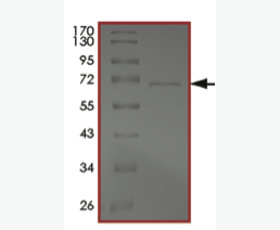Recombinant Human Interleukin-17A/IL-17A
| Product name: | Recombinant Human Interleukin-17A/IL-17A |
| Source: | Human Cells |
| Purity: | Greater than 95% as determined by reducing SDS-PAGE. |
| Buffer Formulation: | Lyophilized from a 0.2 μm filtered solution of 20mM PB,150mM NaCl,pH7.4. |
| Applications: | Applications:SDS-PAGE; WB; ELISA; IP. |
| Storage: | Avoid repeated freeze/thaw cycles. Store at 2-8 oC for one month. Aliquot and store at -80 oC for 12 months. |
| UOM: | 100ug/50ug/200ug/1mg/1g |
| Source | Human Cells |
| Description | Recombinant Human Interleukin-17A is produced by our Mammalian expression system and the target gene encoding Gly24-Ala155 is expressed with a 6His tag at the C-terminus. |
| Names | Interleukin-17A, IL-17, IL-17A, Cytotoxic T-Lymphocyte-Associated Antigen 8, CTLA-8, IL17A, CTLA8, IL17 |
| Accession # | Q16552 |
| Formulation | Lyophilized from a 0.2 μm filtered solution of 20mM PB,150mM NaCl,pH7.4. |
| Shipping |
The product is shipped at ambient temperature. |
| Reconstitution |
Always centrifuge tubes before opening. Do not mix by vortex or pipetting. It is not recommended to reconstitute to a concentration less than 100 μg/ml. Dissolve the lyophilized protein in ddH2O. Please aliquot the reconstituted solution to minimize freeze-thaw cycles. |
| Storage |
Lyophilized protein should be stored at < -20°C, though stable at room temperature for 3 weeks. Reconstituted protein solution can be stored at 4-7°C for 2-7 days. Aliquots of reconstituted samples are stable at < -20°C for 3 months. |
| Purity |
Greater than 95% as determined by reducing SDS-PAGE. |
| Endotoxin | Less than 0.1 ng/µg (1 IEU/µg) as determined by LAL test. |
| Amino Acid Sequence |
GITIPRNPGCPNSEDKNFPRTVMVNLNIHNRNTNTNPKRSSDYYNRSTSPWNLHRNEDPERYPSV IWEAKCRHLGCINADGNVDYHMNSVPIQQEILVLRREPPHCPNSFRLEKILVSVGCTCVTPIVHH VAVDHHHHHH
|
| Background | Interleukin-17 is a potent pro-inflammatory cytokine produced by activated memory T cells. There are at least six members of the IL-17 family in humans and in mice. As IL-17 shares properties with IL-1 and TNF-alpha, it may induce joint inflammation and bone and cartilage destruction. This cytokine is found in synovial fluids of patients with rheumatoid arthritis, and produced by rheumatoid arthritis synovium. It increases IL-6 production, induces collagen degradation and decreases collagen synthesis by synovium and cartilage and proteoglycan synthesis in cartilage. IL-17 is also able to increase bone destruction and reduce its formation. Blocking of interleukin-17 with specific inhibitors provides a protective inhibition of cartilage and bone degradation. |














